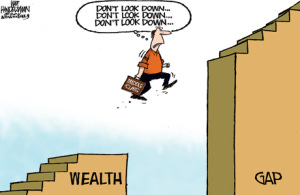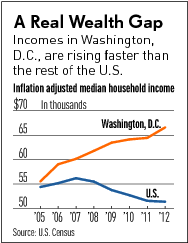How To Increase Inequality


Just continue with the Obama-Federal Reserve-Treasury policies of the past five years.
The middle class and the poor are being taken for a ride by the political hit men in Washington D.C. The concern expressed for rising inequality and the middle class are directly contradicted by the policy actions these same politicians have taken. The Federal Reserve is funding the patronage machine in D.C. and the financiers and politicians are benefiting. This is your government at work.
From the WSJ:
...when the next financial bubble bursts with horrible consequences for the real economy—average Americans will pay the biggest price.
The Markets Love Yellen—for Now
The new head of the Federal Reserve says monetary policy won't change, unless it does. By Judy Shelton Janet Yellen proved on Tuesday that she has mastered the art of Fed-speak. Testifying before the House Financial Services Committee for the first time as the chairwoman of the Federal Reserve, she said she expects "a great deal of continuity" in policy, including the "taper" of the Fed's quantitative easing, while saying the bond-buying program is "not on a preset course." Markets cheered, with the Dow Jones Industrial Average surging nearly 200 points.
Ms. Yellen is the 15th head of the Fed since its establishment a century ago. She inherited an extremely difficult predicament from predecessor Ben Bernanke. The stock market's volatility since the first of the year has awakened fears that the Fed's efforts to improve economic performance through its bond-buying and near-zero interest-rate policy have worked instead to distort capital flows and misprice financial assets.
Is it possible that economic growth has actually been impaired by the Fed's unconventional monetary policies? Can the world's dominant central bank continue each month to purchase $65 billion in Treasurys and mortgage-backed securities without doing further damage? If it tapers further, does it risk sparking global financial turmoil?
Worries about the boom-and-bust consequences of manipulating interest rates are nothing new. The perils of monetary "stimulus" were hotly debated in the 1930s by economists John Maynard Keynes and Friedrich Hayek. When confronted with rising unemployment amid economic depression, the political compulsion to act results in higher government spending and easy money.
But over time, does government intervention retard the natural workings of free markets to deliver prosperity? This question is at the heart of any discussion about the appropriate role of the Federal Reserve. One hopes Ms. Yellen will address it when she testifies before the Senate Banking Committee on Thursday.
In 1913 the Federal Reserve's relatively modest purpose was to provide emergency supplies of currency to local banks to satisfy unanticipated customer demands for cash. The nation was still on a gold standard, so the notion of deliberately expanding or contracting the money supply to affect economic performance wasn't considered a viable government option.
The Fed's rise to prominence and influence really began in 1935 under President Franklin Roosevelt. The year before, Roosevelt had devalued the dollar from $20.67 to $35 per troy ounce of gold by executive proclamation. Now he initiated a reorganization of the Fed that would shift power from regional bank districts to Washington, D.C. Roosevelt appointed Marriner Eccles as chairman of the Fed's Board of Governors and authorized him to conduct national monetary policy through the newly centralized banking system.
Eccles was initially an advocate for government stimulus to spur the economy during slack periods to reduce unemployment. He embraced the Keynesian formula for running government deficits and surpluses over the business cycle. But he became increasingly uncomfortable the following decade with the assumption that the Fed would forever absorb excess government spending by injecting more money into the system—and thus inflict future higher prices on the population. By the time Eccles stepped down in 1948, he was fiercely opposed to the administration's inflationary war financing.
The lesson Ms. Yellen might draw from the Eccles experience—his name adorns the Fed's formidable headquarters on Constitution Avenue in Washington—is that stimulus isn't meant to be permanent. At some point government expenditures must be paid for with tax revenues.
Even as Ms. Yellen insists that the Fed is pursuing "highly accommodative" monetary policy to achieve specific economic growth objectives, it is clear that her approach also bails out federal deficit spending. She can hardly argue that emergency conditions still warrant extraordinary measures by the Fed—especially after testifying that economic recovery has "gained greater traction" in the past seven months. It has been 4½ years since the recession presumably ended. So why is Ms. Yellen sticking with the notion that the Fed intends to suppress interest rates far into the future?
During the nomination process, President Obama made it clear that, given a choice between reducing unemployment or keeping prices stable, he wanted a Fed chief who would lean toward the former. Unfortunately, this makes it more difficult for Ms. Yellen to convincingly assert the independence of monetary policy from political considerations.
During Tuesday's hearing, she referred several times to the need to raise the inflation rate to 2% or even higher—which means her definition of price stability would let the dollar lose more than 20% of its value each decade. Ms. Yellen might keep in mind what happened to Arthur Burns, who ran the Fed under President Richard Nixon and was considered a Republican loyalist.
While Burns was an eminently qualified economist, his reputation was tarnished by the perception—borne out by the Nixon tapes—that he succumbed to presidential pressure to conduct expansionary monetary policy to spike economic growth in the run-up to the 1972 election.
Paul Volcker took over the Fed in 1979, a tumultuous period as inflation ultimately reached 13.5% in 1981 before it was squeezed out through monetary discipline. If Ms. Yellen were to listen to Mr. Volcker, she might get a different take on whether tension actually exists within the Fed's so-called "dual mandate" to achieve both maximum employment and price stability.
"I find that mandate both operationally confusing and ultimately illusory," Mr. Volcker said in a speech to the Economic Club of New York last year. "It implies a trade-off between economic growth and price stability, a concept that I thought had long ago been refuted not just by Nobel Prize winners but by experience."
Then again, Ms. Yellen is credited with successfully convincing Alan Greenspan that mild inflation does little harm, and is actually a good thing. She was relatively new to the Fed Board of Governors in 1996, but Fed meeting transcripts reveal that Ms. Yellen talked then-Chairman Greenspan out of his goal of driving inflation down to zero. In true Keynesian fashion, she reasoned that workers want higher nominal wages even when higher prices negate them; better to accept the money illusion benefits of 2% inflation than to risk slipping into a deflationary spiral with rising unemployment.
It is ironic that concern for wage earners serves to justify money pumping by the Fed that ends up largely benefiting people who have hefty stock-market portfolios, especially at a time when "income inequality" is a major White House theme.
Perhaps one of our elected representatives on Capitol Hill can explain to Ms. Yellen that when the low-grade fever of perpetual inflation becomes a full-blown economic malady—when the next financial bubble bursts with horrible consequences for the real economy—average Americans will pay the biggest price.
----------
Unfortunately, almost all our elected representatives are in on the game. Most of them have hefty stock portfolios and can legally trade on inside information based on pending legislation. Can you see something wrong with this picture?



